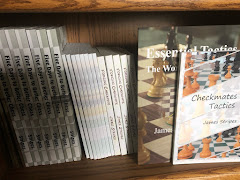Of making books there is no end, and much study is a weariness of the flesh.
Ecclesiastes 12: 12
Some writers pump out books and articles as if writing is as easy as breathing. But not all these prolific writers put out good quality. It is well known in many circles, for example, that the great quantity of texts put out by Eric Schiller could use improvement in quality. His reputation is such that John Watson prefaced positive comments regarding a Schiller authored CD with the phrase, “At the risk of being controversial” (Chess CDs: Coming of Age?). Edward Winter’s criticism is more strident: he lists a Schiller text (written with Raymond Keene) among the “five worst chess books” (ChessBase News), and in “Copying” documents evidence of plagiarism in his books. Schiller’s The Big Book of Combinations (1994) not only originates almost in its entirety from The Encyclopedia of Chess Middlegames (1980), it reproduces errors from the original.
Bill Wall is another prolific writer whose work in chess history is nearly endemic in cyberspace. In the Endless Quiz at chess.com, for example, one of the top scorers has a mediocre percentage of correct answers, but has submitted a great many questions that appear to originate from Bill Wall’s Geocities site. Tryfon Gavriel asked about the accuracy of Wall’s “Correspondence (Postal) Chess” at The Correspondence Chess Message Board and received from Tim Harding the reply, “i would warn all readers that the byline on that page is not a guarantee of quality, rather the reverse in my opinion.”
Another category of “poser” might include the one book wonder, Michael de la Maza. His Rapid Chess Improvement (2002) is regularly stocked in bookstores, and has stimulated numerous clubs, blogs, and forum discussions. Jeremy Silman points out the grandiose nature of some of the claims of MDM (as he is often called in online forums), and notes that there is nothing new in MDM’s point that “tactical skill acquired by hard work will make you much stronger” (Review of Rapid Chess Improvement). It doesn’t take long looking at Michael de la Maza’s Member Details page at the USCF to notice a couple things. His claim that he started in the 1100s is misleading. His initial established rating was 1344, and he had some results that would suggest he might be stronger than that to start out. Many of his losses were to unrated or provisionally rated players that quickly rose into the B and C classes. De la Maza, for his part, rose quickly it would seem not only because he worked at chess an average of three hours per day, but because the level of his competition taught him many things. There’s no reason to believe he had acquired the bad habits that most adult players must correct in order to improve (the sort that online blitz reinforce, further hindering progress). Moreover, de la Maza no longer competes at chess—this fact alone should give pause to all those that wish to imitate his rise.













